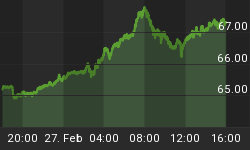There appears to be just over one week left for the Eurozone Finance Ministers to resolve the Eurozone debt crisis or face a collapse of confidence in it and the euro. This need not lead to a collapse of the two though. In perhaps an underestimated situation, the discord among the members of the "Europe United" bloc, the seeming inability to permanently resolve the crisis is well on the way to that end.
It is an underestimated crisis because it will affect the confidence in the entire global system of currencies. Already the warning signals are being fired in the U.S. as they face similar and sometimes worse financial crises than some of the members of the Eurozone. If the euro goes down, the dollar will come under pressure but not fully until there is a viable alternative to the dollar, which at the moment there isn't.
To make it clear, what has been happening since the Eurozone began, within the zone we need to look at the nations before they became part of that zone.
Why Germany wanted into the Eurozone.
Germany has a remarkable work and efficiency ethic and always has. This has made their products attractive globally. Their work ethic leads to far longer work hours and acceptance of lower wages too. This translates into a persistent Balance of Payments [exports - imports for goods and capital] surplus much the same as we are seeing in China now. Within the Eurozone over the life of the EU, this has meant that capital and export proceeds have osmoticaly moved to Germany. The joy for Germany has been that the euro allowed them to escape the restraints of the Deutschemark, which reflected these surpluses through a persistently rising exchange rate against all others. This, in turn, stunted the global attractiveness of German goods internationally, as well as in Europe. The principle as now put forward by Mr. Timothy Geithner, U.S. Treasury Secretary, that exchange rates should affect economic fundamentals, came into play on the Deutschmark and kept making it more expensive in other currencies. When the opportunity arose to remove the Deutschmark and replace it with a European wide currency, the euro came along. What a huge break and benefit to Germany's European trade competitiveness. It had the same effect as instituting a fixed exchange rate regime throughout Europe! This meant that capital as well as export proceeds flowed to Germany making it the most powerful nation in the zone. But conversely, manufacturing blossomed there at the expense of the other Eurozone members. This is a fundamental rivet locking Germany into the Eurozone. The only reason why Germany will not accede to any recommendations that we will see in the next week or so, will be because they will prove more costly than the benefits of the euro itself to Germany.
Why is there such a crisis in the Eurozone?
The southern Mediterranean nations Greece, Portugal and Spain have always had a problem with corruption and overbearing bureaucracy that has made efficiency a distant dream. Greece as we all saw 'cooked' the books and tends to accept tax evasion. Until they can overcome these traits, there appears to be little point in having a plan to rectify their debt problem. With the austerity measures put forward, the question is, will they be able to keep them up and bring in enough to repay their debt? After all, their wealth came essentially in supplying villas and holidays for the industrial nations to their north, particularly Germany. With the property market drying up in those countries, where are they going to earn enough to repay their huge debts?
Belgium, a politically divided nation on the brink of splitting, is facing similar problems. Italy, with its operatic politics, does not appear reliable enough to stick to the disciplines of austerity measures either.
So it is not simply about an adequate rescue package, it is about being able to stick to the disciplines involved. The lack of proper financial discipline that led them there in the first place must be overcome for that to happen. So after over 2,000 years of a discordant Europe will we see financial restraints do what has not happened before?
Is there really a solution to the Eurozone debt crisis?
The rejection of the I.M.F. suggestion of a bigger rescue facility and the rejection of the notion of a Eurozone Bond by Germany may well be more costly overall than the euro benefits. After all, there has to be a limit on lending your customers more money than they can buy from you? But we believe that only if the plight of the bulk of the Eurozone nations becomes too much for Germany, will it exit the Eurozone.
There are cheaper and more expedient ways to come to some sort of compromise. The advantage to Germany no longer lies with the poorer southern nations for future trade and capital, but in the richer northern neighbors. But to date, Ireland has been helped out. Will Germany see little gain to rescuing Spain and Portugal and Belgium? Thereby hangs the question, not in any philanthropic neighborly act. If we don't have a solution in a week's time, then expect to see moves to force an exit of Portugal and Spain from the Euro and perhaps the Eurozone. Italy remains an unanswerable situation until we have seen the Iberian Peninsula nations resolved one way or another. This will be the most dramatic of moves, but will leave the stronger residual rest of the Eurozone and a stronger euro. It will also leave Germany with its better customers who can still afford to pay for German goods. This may appear to be a skeptical view of matters, but we have been often reminded that nations don't have friends, only interests.
The Impact on the Euro and Gold - Subscribers only - Subscribethrough www.GoldForecaster.com















